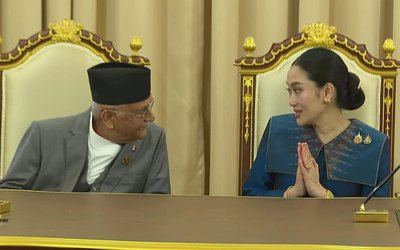More on International






Looking abroad, Barak Obama has been reelected for the next four years, China is undergoing a leadership change and India's ruling Congress I Party is also facing its popularity test in the three state elections. However, Nepal's domestic politics remain, as usual, facing another phase of political instability. With the postponement of elections announced for November 22, nobody knows for sure when the next elections will take place and even if the elections are held, what will be the outcome for Constituent Assembly or Parliament? Obama's reelection will make no difference to Nepal's internal dynamics; China's leadership change and consequentnew policy will have definite impact. The new leadership has already announced a ‘go west’ policy, which will possibly bring money to Tibet and beyond the border, including into Nepal. However, Nepal's development will depend upon how tactfully Nepal can handle the situation to go in its favor. India's forthcoming state elections will have also certain impact in Nepal.
Despite the change in leadership, India and China's strategic interest remain the same. China's interest in Nepal will link to Tibet, and India's interest will be to safeguard its northern plains. Nepal does not have enough space to play between the two neighbors. "With Obama’s win, Nepal can expect continuity of help in health, environment and agriculture sectors, the areas Obama’s aid policy has helped Nepal the most," said former foreign minister Dr. Bekh Bahadur Thapa, replying to questions regarding what Obama's win means for Nepal, in an interview with Republica. "Based on how China has conducted itself so far, it has remained silent on Nepal’s internal matters. China will obviously try to safeguard its national interests and that will be determined to the extent our assurance is credible. Other than that, the leadership change won’t affect Nepal much," Dr. Thapa affirmed.
As the world's major countries are in a fest of elections and leadership changes, Nepal has been passing through its two major festivals. Despite their efforts to find a solution, Nepalese political leaders don't find ways to settle their differences. Whether there is change in government leadership or continuation of the present government led by Baburam Bhattarai, a major showdown is inevitable after Dipawali and Chhat festival, a festival widely celebrated in the Southern plains of Nepal. Don't even talk about the economy.
Nepal's reality for the last 250 years or so has been a perpetuation of political instability which has allowed the nation to continue as an independent country. Rana's uprooting and the abolition of the monarchy led to the present set up, which blames the monarchy as a source of instability. The signing of the peace process with the Maoists, political leaders, civil society leaders, rights activists, donors and neighbors heralded a new era for New Nepal. However, nothing changes in terms of politics. What change is the centre of power? The change brought to make all Nepalis powerful actually makes Nepalis powerless.
What renowned American Scholar late Leo Rose said in his famous book Strategy for Survival that Nepal's ruler from Prithvi Narayan Shah to 10th King of his dynasty Mahendra faced a similar situation. Sandwiched between two nations India and China, Nepal's leadership, including the present prime minister, has a similar fate and Nepal has little space in which to maneuver. Knowingly or unknowingly, intentionally or in ignorance, Nepal's elite and analysts ignore this hard reality of Nepal's politics.
Imminent constitutional lawyer and political analyst Ganesh Raj Sharma used to say, "bring any constitution, it is doomed to fail." Nepal's internal problems have external influence. Had Nepal's political leadership shown maturity a decade ago, Nepal would not have to face the present scenario. The country has made much progress," wrote Sharma. After changing six constitutions in just six decades of time, Nepal has to understand a new constitution is neither a solution nor it is a problem, there is something else.







